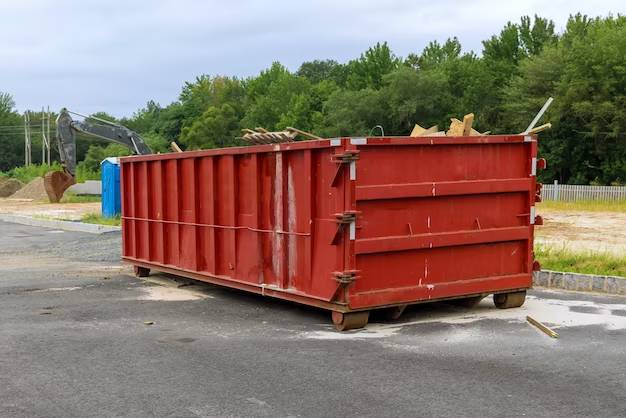✓ Friendly knowledgeable staff
✓ Large inventory of dumpster sizes
✓ Call (727) 353-6083 for an immediate quote!
✓ Flexible and fast delivery and pickup
✓ Customer satisfaction guaranteed
Construction is a major industry that has a significant impact on the environment. It produces a vast amount of waste that ends up in landfills. This waste not only takes up valuable space but also contributes to greenhouse gas emissions, pollution, and other environmental problems. Recycling construction materials is an effective way to reduce the impact of this waste on the environment.
Construction materials that can be recycled
Construction materials can be broadly classified into two categories: natural materials and synthetic materials. Natural materials include wood, stone, concrete, and metals such as steel and copper. Synthetic materials include plastics, insulation, asphalt, and roofing materials.
Some of these materials can be recycled, while others cannot. Let’s take a look at some of the most common construction materials and whether they can be recycled.
Wood: Wood is one of the most common construction materials, and it can be recycled. Wood waste can be processed into mulch, particleboard, or other products. It can also be used as fuel to generate electricity.
Concrete: Concrete is another common construction material that can be recycled. Crushed concrete can be used as aggregate for new concrete or as a base material for roads and other construction projects.
Metals: Metals such as steel, copper, and aluminum can be recycled indefinitely without losing their quality. They can be melted down and used to make new products.
Plastics: Plastics are widely used in construction, but they are difficult to recycle. Many plastic products are not designed for recycling, and they can contaminate other materials in the recycling stream. However, some types of plastic can be recycled, such as PVC pipes and roofing membranes.
Asphalt: Asphalt is another construction material that can be recycled. Old asphalt can be ground up and used to make new pavement.
Roofing materials: Roofing materials such as asphalt shingles and metal roofing can be recycled. Asphalt shingles can be ground up and used to make new pavement, while metal roofing can be melted down and used to make new products.
Insulation: Insulation is a common construction material, but it can be difficult to recycle. Some types of insulation, such as fiberglass, can be recycled, while others, such as foam insulation, cannot.
How to recycle construction materials
Recycling construction materials requires a different approach than recycling household waste. Construction waste is often bulky and heavy, and it requires specialized equipment and facilities to process it.
Here are some of the steps involved in recycling construction materials:
Sorting: The first step in recycling construction materials is to sort them by type. This helps to prevent contamination and ensures that each material is processed in the most effective way.
Transportation: Once the materials have been sorted, they need to be transported to a recycling facility. This can be a challenge, as construction waste is often heavy and bulky. Specialized trucks and equipment may be required to transport the waste.
Processing: After the materials have been transported to the recycling facility, they are processed. This may involve crushing, shredding, or melting the materials down. The goal is to turn the waste into a material that can be used to make new products.
Manufacturing: The final step in the recycling process is to manufacture new products using recycled materials. This can involve mixing recycled materials with new materials to create a product with the desired properties.
Benefits of recycling construction materials
Recycling construction materials has several benefits, both for the environment and for the construction industry.
Reducing landfill waste: Recycling construction materials reduces the amount of waste that ends up in landfills. This helps to conserve valuable space and reduces the environmental impact of landfills.
Conserving resources: Recycling construction materials conserves natural resources such as wood, metals, and stones. This helps to reduce the demand for these materials, which can help to protect natural habitats and reduce the environmental impact of mining and logging.
Reducing emissions: Recycling construction materials can reduce the amount of energy and emissions required to produce new materials. This can help to reduce air pollution and greenhouse gas emissions.
Creating jobs: Recycling construction materials can create new jobs in the waste management and recycling industries. This can help to boost the economy and provide new employment opportunities.
Summary
Recycling construction materials is an effective way to reduce the environmental impact of waste. It can help to conserve resources, reduce emissions, and create new jobs. As the demand for recycled materials increases, more construction companies are likely to embrace recycling as a way to reduce their environmental footprint.
✓ Friendly knowledgeable staff
✓ Large inventory of dumpster sizes
✓ Call (727) 353-6083 for an immediate quote!
✓ Flexible and fast delivery and pickup
✓ Customer satisfaction guaranteed
